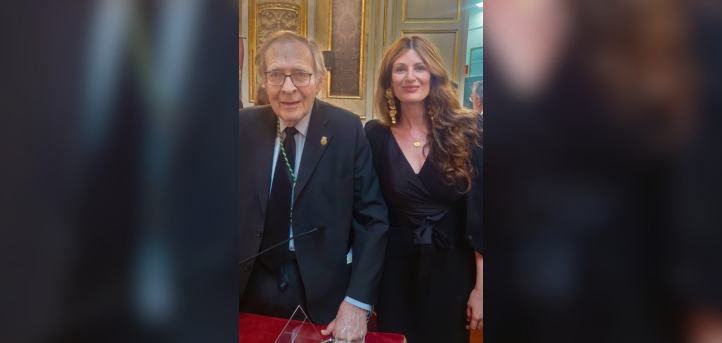The economist, politician and historian Ramón Tamames has been distinguished with the Prize for the History of Spanish Action in America, awarded by the Royal Academy of Doctors of Spain. The ceremony, which took place in the Paraninfo of the Complutense University of Madrid, brought together numerous personalities from the academic, political and social spheres. During his speech, Tamames made special mention of Dr. Silvia Aparicio, Vice-Rector of the European University of the Atlantic (UNEATLANTICO).
Silvia Aparicio has worked closely with the professor for more than 30 years, updating his books, as well as writing reports and articles.
Emilio de Diego delivered a laudatio highlighting Tamames’ brilliant career and his multifaceted contribution to the fields of economics, politics and history. De Diego recalled Tamames’ beginnings in the academic world, from his training in medicine, influenced by his father, to his eventual switch to a career in law. He also underlined his tireless curiosity and desire to explore different disciplines, which led him to interact with prominent figures such as Baroja, Zubiri and Severo Ochoa.
De Diego pointed out Tamames’ deep faith in both God and Spain, highlighting his courage in presenting a motion of censure at the age of 90, a reflection of his unwavering commitment to the country. He also mentioned Tamames’ numerous publication records and his ability to connect with diverse fields of knowledge and culture.
In his speech after receiving the award, Professor Tamames took the opportunity to reflect on the legacy of the Spanish empire, underlining its inclusive nature and rejecting indigenist prejudices. He highlighted the historical importance of the Treaty of Tordesillas and the creation of the viceroyalties by Charles III as examples of good governance structures that have endured over time. He also mentioned the milestone of the Pacific trade, known as the “Spanish Lake”, which brought about unique trade relations between China, New Spain and Seville, a historical feat that, according to Tamames, will never be repeated.
In his speech, Tamames mentioned several personalities and collaborators, thanking Rouco Barela, Juan Abelló, Esperanza Aguirre, Cristian Careaga, Juan Lladró, the Marquise de las Almenas, Jesús Palacios, José Manuel Revuelta and Benigno Pendás and Silvia Aparicio. He also highlighted the role of contemporary historians such as Elvira Roca Barea, Pablo Victoria, Marcelo Gullo and Manuel Lucena, who, according to Tamames, have contributed to a better understanding of the history of Spain and its legacy in America.
The event concluded with a message of optimism from Tamames, who urged to move forward with modesty, discarding prejudices, lies and misrepresentations, and embracing a new cultural mestizaje. He stressed the importance of recognising and valuing the historical legacy of the Spanish empire, and the opportunity to build a better future based on knowledge and cooperation. Importantly, this recognition is a testament to Tamames’ lasting impact on history and culture, and his ability to inspire future generations.


